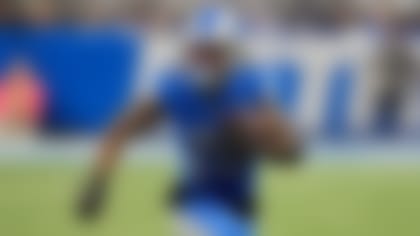Super Bowl LVI's in the books, ending the longest season in NFL history. How did the new guys perform in the expanded 285-game slate? Gennaro Filice and Nick Shook are taking a division-by-division look at each team's rookie class, providing grades and analysis on Year 1 production. Filice examines the AFC East below.
Round 1
- (No. 6) Jaylen Waddle, WR, 16 games/16 starts
- (18) Jaelan Phillips, OLB, 17 games/5 starts
Round 2
- (36) Jevon Holland, S, 16 games/13 starts
- (42) Liam Eichenberg, OT, 17 games/16 starts
Round 3
- (81) Hunter Long, TE, 7 games/2 starts
Round 7
- (231) Larnel Coleman, OT, 0 games
- (244) Gerrid Doaks, RB, 0 games
Notable Undrafted Free Agent
- Robert Jones, OG, 8 games/1 start
The NFL is typically the great equalizer for college football gamebreakers. In the pro game, everyone's freakishly athletic. And yet, watching Waddle on Sundays felt just like watching Waddle on Saturdays, with the same thought invariably springing to mind: That guy just looks different. In a sea of physical marvels, Waddle's explosiveness still stands out. Every touch puts you on the edge of your seat. And while the Alabama product set a rookie record with 104 catches, somehow he seemed underutilized. Peppered with quick throws throughout his rookie campaign, Waddle rarely had the opportunity to showcase his downfield dynamism. (Don't let the 5-foot-10, 182-pound frame fool you -- Waddle has no problem making contested catches.) Here's hoping the new coaching staff unlocks MAXIMUM WADDLE in 2022. Mike McDaniel's recent words on the receiver inspire confidence: "I would start him in fantasy."
Waddle wasn't the only Year 1 stud from this Dolphins draft class, either. Displaying the kind of versatility today's NFL teams covet in the safety position, Holland stuffed the stat sheet with 68 tackles, 10 passes defensed, seven QB hits, two fumble recoveries, 2.5 sacks and two interceptions. The second-rounder posted in the entire rookie class, only trailing Offensive Rookie of the Year Ja'Marr Chase, Defensive Rookie of the Year Micah Parsons and egregious Pro Bowl snub Creed Humphrey. Meanwhile, Phillips really came on in the back half of the season, finishing with 8.5 sacks and earning a spot alongside Waddle and Holland on .
On the down side, Eichenberg continued a recent Dolphins tradition of throwing a rookie O-lineman into the fire and watching him suffer fourth-degree burns. A 16-game starter, Eichenberg committed 10 penalties and gave up nine sacks as one of the leakiest bookends in the NFL.
Round 1
- (No. 15) Mac Jones, QB, 17 games/17 starts
Round 2
- (38) Christian Barmore, DT, 17 games/2 starts
Round 3
- (96) Ronnie Perkins, OLB, 0 games
Round 4
- (120) Rhamondre Stevenson, RB, 12 games/2 starts
Round 5
- (177) Cameron McGrone, LB, 0 games
Round 6
- (188) Joshuah Bledsoe, S, 0 games
- (197) William Sherman, OT, 1 game/0 starts
Round 7
- (242) Tre Nixon, WR, 0 games
The fifth quarterback off the board inarguably enjoyed the best rookie campaign of the bunch. Dogged by skeptics (including this hack) throughout the pre-draft process and then the entire summer leading up to the 2021 campaign, Jones proceeded to guide New England back to the playoffs, hit the Pro Bowl and finish second in Offensive Rookie of the Year voting. While dual-threat quarterbacks are all the rage these days, this Alabama alum is a throwback pocket passer. That's not to say he's a sitting duck -- like a certain G.O.A.T. who pastured in Foxborough for two decades, Jones possesses the kind of deft pocket movement that bedevils a pass rush. And while his raw athleticism and arm strength leave something to be desired, Jones is a highly accurate thrower with a cerebral grasp of the game well beyond his years. With a playing style that's long on efficiency and short on electricity, Jones' long-term ceiling remains an open question. But the floor is far higher than many anticipated. Resident QB obsessive Gregg Rosenthal ranked Mac as a top-half starting quarterback in Year 1.
With Jones as the headliner, the Alabama-New England pipeline treated the Patriots quite well in this draft class. Famous friends with Nick Saban, Bill Belichick immediately doubled down on the Tuscaloosa talent pool by snatching up Barmore with the Pats' second selection. As the first defensive tackle off the board at No. 38 overall, Barmore proved to be a Round 2 coup. That interior disruption he exhibited in Alabama's 2020 national title run? Yeah, it translated seamlessly to the NFL, as Pro Football Focus charted Barmore with 48 QB pressures.
Stevenson's another hero for the "DON'T WASTE HIGH PICKS ON RUNNING BACKS!!" crowd. The fourth-rounder finished as PFF's highest-graded rookie RB, averaging a robust 4.6 yards per carry as a tackle-breaking bowling ball.
Round 1
- (No. 2) Zach Wilson, QB, 13 games/13 starts
- (14) Alijah Vera-Tucker, OG, 16 games/16 starts
Round 2
- (34) Elijah Moore, WR, 11 games/6 starts
Round 4
- (107) Michael Carter, RB, 14 games/11 starts
Round 5
- (146) Jamien Sherwood, LB, 5 games/4 starts
- (154) Michael Carter II, DB, 15 games/7 starts
- (175) Jason Pinnock, CB, 12 games/2 starts
Round 6
- (186) Hamsah Nasirildeen, LB, 12 games/2 starts
- (200) Brandin Echols, CB, 14 games/14 starts
- (207) Jonathan Marshall, DT, 4 games/0 starts
Notable Undrafted Free Agent
- Matt Ammendola, K, 11 games/0 starts
- Isaiah Dunn, CB, 12 games/1 start
Let's start with the bad: Wilson just did not look like an NFL quarterback in Year 1. After sitting behind BYU's impenetrable wall of an offensive line and lighting up college football in 2020, the No. 2 overall pick experienced a rude awakening in the NFL. Outside of a strong Week 17 start where he nearly led the Jets to a shocking upset of the Buccaneers, the 22-year-old consistently appeared overwhelmed. Wilson didn't just fail the eye test, either, finishing dead last among qualified QBs in passer rating, second-to-last in QBR and in the nether regions of PFF's QB grades and Gregg Rosenthal's final rankings. Oh, and then franchise legend Joe Namath . Sad. Now, one year a career does not make. Wilson still has the tools for this trade, with natural arm talent and underrated athleticism. (Remember the 52-yard TD scamper?!) But he was just in above his head as a rookie starter. And something tells me the New York media beast won't exactly practice patience if he doesn't show significant improvement early on in Year 2.
Now for the good: While the Jets' first selection struggled mightily, their next three picks provided positive returns in three need areas. Vera-Tucker made as an athletic left guard who's a weapon in the run game. If Mekhi Becton can get his body () right this offseason, the Jets will head into 2022 with an enticing young combo on the left side of the offensive line. Moore, New York's only pick on Day 2 of the draft, missed multiple games due to injury, but when he played, he showed plenty of promise. Before suffering the quad injury that prematurely ended his season in early December, Moore was on a six-game tear that saw him rack up 34 catches for 459 yards and five touchdowns -- and that was with four different quarterbacks throwing him the football! Michael Carter also dealt with injuries, but the fourth-rounder was easily New York's best backfield weapon as a runner and receiver. Coincidentally, he wasn't the only Michael Carter to produce in this rookie group, as Michael Carter II did a pretty nice job as the team's starting nickelback.
Round 1
- (No. 30) Gregory Rousseau, DE, 17 games/17 starts
Round 2
- (61) Carlos "Boogie" Basham, DE, 8 games/0 starts
Round 3
- (93) Spencer Brown, OT, 13 games/10 starts
Round 5
- (161) Tommy Doyle, OT, 11 games/0 starts
Round 6
- (203) Marquez Stevenson, WR, 5 games/0 starts
- (212) Damar Hamlin, S, 14 games/0 starts
- (213) Rachad Wildgoose, CB, 5 games/0 starts (w/ NYJ)
Round 7
- (236) Jack Anderson, OG, 2 games/1 start (w/ PHI)
Following a disappointing season from the Buffalo defense in 2020, Brandon Beane and Sean McDermott clearly went into the 2021 draft seeking more edge juice, ultimately spending their first two picks on a pair of defensive ends. Rousseau created quite a buzz in August, titillating Bills beat writers throughout training camp and then recording a sack in each of his first two preseason games. In his second regular-season game, he notched two QB takedowns. And after he sacked and picked Patrick Mahomes in a Sunday night blowout of the Chiefs at Arrowhead, the hype train hit full throttle. During a media session the day after that Week 5 win in Kansas City, McDermott got one too many fawning questions about the Rousseau. "Can we just hold our horses a little bit here today?" . "These guys are rookies. I mean, yeah, he made some really good plays -- I don't want to take that away from him. Those plays made a big difference in the outcome of the game. But there's still so much, so much to be had yet in terms of his growth and development. ... These young guys gotta learn that it's a week-to-week league, and when you think you've arrived, you haven't." Call that man McDermostradamus! Rousseau didn't record another sack until Week 17, after opting out of his final college season due to the COVID-19 pandemic. Nevertheless, he started all 19 games, including the playoffs. Basham was another matter, as a healthy scratch for half the regular season and a rotational player when active. On the plus side, he maximized limited snaps in Week 18 and the two playoff games, providing seven pressures and two sacks in a nice season-ending surge. With Jerry Hughes and Mario Addison past their prime and set to hit free agency, the Bills need Rousseau, Basham and 2020 second-rounder A.J. Epenesa to make the leap in 2022.
Now, I'd be remiss if I didn't mention the one impact player taken after Buffalo's early edge binge. Brown started 12 games, including both playoff contests. The 6-8, 311-pounder out of Northern Iowa looks like a keeper as a road-grading right tackle.
Follow on Twitter.
















